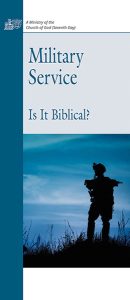
Is It Biblical?
Does Holy Scripture approve, or disapprove, of Christ’s followers participating in military warfare? That is the question this study addresses.
In the wider Christian community, most churches and Bible students answer the question with a hesitant and qualified “Yes, Jesus’ disciples may take up physical weapons to fight for their country.” The hesitancy about their “yes” stems from the near-universal recognition that war is inherently evil and never God’s perfect will. Still, they view it as the lesser of two evils.
Christians may also qualify their “yes” to war by appealing to a historical viewpoint known as the “just war” theory. This teaches that Jesus’ faithful followers may not serve in any and every war but may serve in those wars that meet certain established criteria.
The Church of God (Seventh Day) is one of a few churches that take a firmer stance against military warfare than the preceding paragraphs describe. Our unwillingness to endorse taking up arms for military service in behalf of our country is based on the example and teachings of Jesus Christ, the Savior and Lord. We turn to those now.
A different kingdom
In a brief dialogue with the Roman governor, Pontius Pilate, Jesus spoke these words: “My kingdom is not of this world. If My kingdom were of this world, My servants would fight, so that I should not be delivered to the Jews; but now My kingdom is not from here” (John 18:36).
A few hours earlier, Jesus warned an angry, militant Peter, “Put your sword in its place, for all who take the sword will perish by the sword” (Matthew 26:52).
In these two verses, Jesus cut to the heart of this issue by contrasting the identity and methods of His kingdom with those of earthly kingdoms. In the kingdoms of this world, nations fight against other nations with wars and threats of war. Nations rise and fall by their military strength or lack thereof. Soldiers are drafted or hired into the service of defending national borders or crossing them in national interests. For the same reason, soldiers from one country kill soldiers from another — and are themselves killed, knowing that those they kill are also made in God’s image and may well be Christ’s followers even as they are. All this is standard practice in the kingdoms of this world.
Christ came armed with a different worldview, a different approach to conflict resolution, and a different kingdom not founded by military conquest and not dependent on physical force for its defense. Unlike the kingdoms of this world, Jesus governs as Savior and Lord over all through a sacrificial cross rather than a dominating sword. Unlike those realms that rule the earth’s territories and tribes, His throne transcends national borders to exercise its reign in human hearts.
Jesus introduced a kingdom of God in which both territory and warfare are spiritual. In it, His soldiers don different armor: a helmet of salvation, a breastplate of righteousness, a loin plate of truth, and boots of gospel peace (Ephesians 6:11-16). The weapons Jesus provides are a shield of faith and the Spirit’s sword — God’s Word. In Christ’s kingdom, the citizenry so armed wins many unlikely victories by loving their enemies and yielding earthly rights in a greater cause.
Christ’s words to Pilate, then, affirm that He has a kingdom and that He is its king (John 18:36, 37). It is spiritual territory, consisting of human hearts and lives that recognize His Lordship and yield to it. All citizens of Christ’s kingdom are called to its service and constitute its standing army (2 Corinthians 10:1-5).
Being citizens of Christ’s kingdom does not deny followers of Jesus their citizenship in earthly kingdoms as well. It does affirm, however, that where duties clash, what’s owed to Christ takes priority over what’s owed to Caesar. The issue of military service is one in which our Lord’s higher calling overrules Christians’ duty to their nation.
Old covenant and new
In military warfare, a sharp contrast exists between the practice of God’s people (Israel) and God’s people, the church. Under the old covenant, God authorized Moses, Joshua, David, and other Hebrew leaders to wage physical war against nations and tribes that had polluted the land of Canaan with their sins or threatened Israel with invasion and servitude. Under the new covenant in Christ, however, the people of God are no longer identified primarily with one political entity like Israel; they come from every nation. In this universal faith, no earthly nation has been authorized by God to subdue another or seize its territory by waging war, nor has Jesus Christ authorized His followers to serve the armies of any earthly nation so engaged in military combat.
We see this contrast in the words of Jesus, who preached to those under Roman occupation, “You have heard that it was said, ‘You shall love your neighbor and hate your enemy.’ But I say to you, love your enemies, bless those who curse you, do good to those who hate you, and pray for those who spitefully use you and persecute you” (Matthew 5:43, 44).
Jesus drew the line not between one nation and another but between heaven’s values and earth’s. He taught, for example, to lay up treasures in heaven, not focus on earthly things that could be plundered by thieves or taken by armies. He instructed His followers to flee from Jerusalem when it came under siege, not participate in its defense. He predicted persecution of believers and said that some would be put to death, but He offered little hint that His followers should defend themselves against that possibility.
On the contrary, Jesus blessed the peacemaker and the persecuted (vv. 9, 10). He said that if someone takes your coat, let him have your cloak also (v. 40). If a Roman soldier compels you to go with him a mile, go with him two (v. 41). In the same context, He said, “But I tell you not to resist an evil person. But whoever slaps you on your right cheek, turn the other to him also” (v. 39).
Jesus taught that His disciples should pay taxes (“Give back to Caesar what is Caesar’s . . .” (22:21, NIV), even if Caesar doesn’t always use the revenue honorably. According to Apostle Paul, human governments play a God-ordered role in providing for the domestic safety of citizens (Romans 13:1-7). But Paul never encouraged Christians to join a militaristic system of national defense, since to do so would compromise the teachings and practice of our Lord. The governing systems of violence that God providentially orders and sovereignly uses are part of the “world” Paul told his readers not to be “conformed” to (12:2). Rather, while the powers that be exercise vengeance and wrath (13:4), he taught the Christians in Rome, “Repay no one evil for evil” (v. 17a), then added:
Beloved, do not avenge yourselves, but rather give place to wrath; for it is written, “Vengeance is Mine, I will repay,” says the Lord. Therefore “If your enemy is hungry, feed him; If he is thirsty, give him a drink; For in so doing you will heap coals of fire on his head.” Do not be overcome by evil, but overcome evil with good (vv. 19-21).
By the Holy Spirit, Christ empowers His disciples not to overpower others with our armies but to courageously win enemies to the gospel in loving surrender of their hearts to Him.
Following the Lamb
How are we to understand all of this in the twenty-first century? Shall we assume that Christians may participate in military conflict, like any other citizen? Or shall we search for and embrace the perspective of Jesus Christ for citizens of God’s kingdom?
To be sure, the life and teachings of Christ erect a different standard than common practice on many issues. Instead of following a crowd to do evil, God’s children choose to follow Jesus’ teaching and example. This raises serious questions about a Christian’s participation in common warfare.
Paul said:
For though we walk in the flesh, we do not war according to the flesh. For the weapons of our warfare are not carnal but mighty in God for pulling down strongholds, casting down arguments and every high thing that exalts itself against the knowledge of God, bringing every thought into captivity to the obedience of Christ (2 Corinthians 10:3-5).
The Old Testament prophets foresaw the coming Prince of Peace and His kingdom, where swords would be beaten into plows and war learned no more (Isaiah 2:4; 9:6, 7; Zechariah 9:10). This precious promise awaits the Lord’s second coming to fill the whole world, but for disciples of Jesus, this King and kingdom of peace have arrived already in the unexpected fashion of His first coming ministry of grace and death on a cross. The Lamb was slain for all God’s enemies. He has made peace; He is our peace (Romans 5:6-10; Ephesians 2:11-17).
Jesus’ instruction in the Sermon on the Mount about nonresistant love of enemies and bold peacemaking in the face of persecution conforms His disciples’ character to His own sacrificial work on the cross. The ethic Jesus commanded to His followers is the same ethic He embodied in His death: “Father, forgive them . . .” (Luke 23:34). Gospel pacifism is cross-shaped and relies on the power of resurrection life. The call to take up our cross is really a call to risk our lives to follow Jesus and proclaim the same reconciling kingdom peace to the world that He proclaimed (Luke 9:23, 24; 2 Corinthians 5:14-21; Ephesians 5:1, 2; 1 Peter 2:21-24; 3:8-11).
Grateful for the blessings of our national heritage and its common defense, Christians should consider the grace and truth of Jesus as even greater blessings. Those who trust the arm of flesh and military weaponry for their defense may be forgetting the greater security found in the God of heaven and in His salvation through Christ. Let us not forget to pray regularly that we might live a quiet and peaceable life, using these blessings to reach the lost with the gospel of life and peace (1 Timothy 2:1-4). How can a Christian kill another for whom Christ died?
May each follower of Christ be led by God’s Word and Spirit to discern the will of the Lord in this matter.
Scripture quotations are from the New King James Version, unless otherwise noted. Copyright © 1982 by Thomas Nelson, Inc. Used by permission. All rights reserved.
Scripture quotations marked (NIV) are from the Holy Bible, New International Version®, NIV® Copyright ©1973, 1978, 1984, 2011 by Biblica, Inc.® Used by permission. All rights reserved worldwide.
